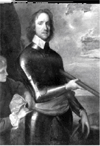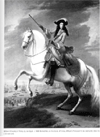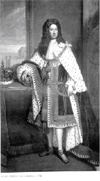

 The story so far: a birth in England, unaccompanied, as far as we know, by any unusual stellar illuminations, in the year 1945 to Jewish immigrants. A fairly typical post-war childhood, followed by an illustrious university career: Cambridge, Oxford, Harvard, Columbia. A well received first publication, in 1977, of Patriots and Liberators, a more than comprehensive study of the gradual collapse of the Dutch Republic at the end of its golden century, described as a tour de force and brilliant synthesis. Since being named the greatest historian of his generation, mainly by J.H. Plumb, his teacher and friend, Schama has more than lived up to this early plug. The charming, chatty eloquence that so enlivens his mature work is evidenced only in patches here, but brilliant patches all the same.
The story so far: a birth in England, unaccompanied, as far as we know, by any unusual stellar illuminations, in the year 1945 to Jewish immigrants. A fairly typical post-war childhood, followed by an illustrious university career: Cambridge, Oxford, Harvard, Columbia. A well received first publication, in 1977, of Patriots and Liberators, a more than comprehensive study of the gradual collapse of the Dutch Republic at the end of its golden century, described as a tour de force and brilliant synthesis. Since being named the greatest historian of his generation, mainly by J.H. Plumb, his teacher and friend, Schama has more than lived up to this early plug. The charming, chatty eloquence that so enlivens his mature work is evidenced only in patches here, but brilliant patches all the same.
A second book a year later, Two Rothschilds And The Land Of Israel, a study of that banking family's grand obsession and its near miraculous culmination in the post-holocaust emergence of Israel, was again well received and duly noted. The appointment to Harvard and the transatlantic trudge it entailed seems to have slowed production a bit, for it was not until 1987 that we saw the release of An Embarrassment of Riches: Dutch Culture In The Golden Age. A more stupendous, entertaining social and cultural history of that marvellous epoch could not be imagined. As Dutch painting had previously implied, our modern world of smoked fish, hot chocolate and prints above the mantelpiece, begins there. Two years later we got the near thousand page Citizens, his take on the French revolution, a subject one would have thought already well served by his profession. Not surprisingly, Schama had given this some thought: "Historians have been overconfident about the wisdom to be gained by distance, believing it somehow confers objectivity, one of those unattainable values in which they have placed so much faith...so that in Citizens, I have tried to bring a world to life rather than entomb it in erudite discourse." Already too old and established to be the young turk storming the gates, this dastardly lunge into the squabbling marketplace was doubtless seen in some quarters as pandering to populism, perhaps even treachery. Such cheery winks continue to this day: just recently, in the Harvard Gazette, he insisted that public discourse in the 21st century "should lie somewhere between Demosthenes and Ozzy Ozbourne", and should be a rhetoric which knows "as Lincoln knew at Gettysburg, just when to shut up."
Some wags, upon scanning the meters-high bulk of his output, might suggest that perhaps he'd best follow his own advice, but not I, for I have become what is known in the biz as a fan. Never much partial to objectivity in the first place, I now reside in the shiny palace of my enthusiasms, but the doors are always open for debate. I would even deride the most common complaint of his detractors: the worst case of bigness on record. True, everything except Dead Certainties verges on the oversized. But do not let the lavish illustrations and shiny heavy stock of Landscape and Memory (1995) and Rembrandt's Eyes (1999) put you in mind of coffee table cocktail chatter trophies: these are books bursting with intelligence at the service of insight and research jostling with wit. Whether you voraciously devour into the dead of night or gingerly shift to save a tender toe, there's never a dull moment to be had in the lot. As for the girth itself, the poor boy's been apologising for it since his first preface, twenty-five years ago: "I had better explain how what began as a trim monograph came to assume proportions of such indecent corpulence." If there was ever a more ironic career overview, I've yet to see it.
His current project, commissioned by the BBC as both book and film, is A History Of Britain. Wildly successful on its home turf from day one, it arrived on these shores last fall to a chorus of cheers muted with a selection of boos. The boos mainly came from other historians, possibly wretched with envy, but perhaps only indignant that his obvious talents had been reduced to mere television. Amidst much carping about minor numerical and geographical errors, the public enthused. The chap from the New York Times claimed he could find an average of two mistakes per page. Despite the greenish tinge of their gaze, I think we can safely assume the accuracy of these professional assessments. Whether we can attribute this to rushed research and slap dash fact checking, quibbling and nit-picking of questionable provenance, or the general decline in the acuity of copy editing is unclear. Whatever the reason, such sloppiness in any such dollar-draining megabook multi-media, is inexcusable.
Schama's own take on the project seems wry. When asked last May, during an online chat, what lead him to make the series he replied, "Crazed optimism". As for exciting debate, he was most enthusiastic. Storytelling being, by its very nature, unavoidably opinionated, he hoped his would "provoke all kinds of disagreement and alternative stories, but that's all to the good as one of my favourite historians, Pieter Geyl, described history as an argument without end." And speaking of stories, whose exactly is he telling? His-tory, her story, our story, or their story? For there are, as you know, factions which favour each. And in the end, it is a fair bit of each: kings, queens, bishops and nobles all get their say. But then so do commoners, of all varieties. One gets the impression that all possible sources were scoured, for marvellous quotes abound.
Like the one from General Berry, post the Puritan revolution Schama declares to be an "experiment in forced virtue that was an immediate dismal flop,"¨"I am much troubled with these market towns, everywhere vice abounding and magistrates fast asleep"(quoting General Berry). Or the Leveller Tom Lilburne, convinced the Commonwealth had only replaced one rapacious oligarchy with another: "All you intended when you set us a-fighting was merely to unhorse and dismount our old riders and tyrants that so you might get up and ride in their stead." This was also the man who infuriated the Puritan mainstream by insisting, in print, that "women were by nature all equal and alike in power, dignity, authority and majesty to men." He and his proto-socialist comrades wound up in the Tower for their temerities, but the Leveller women were soon parading about town, petitioning for their release and making sure their own tracts were printed and distributed. Reading of this and seeing, ultimately, a jury of their peers acquitting them, and in time, their "fire transmuted to Quaker light" where "separated from a fraudulent clergy, salvation could now be a free, voluntary act by anyone old enough to know, ... and that God lived in each and every one, and was simply waiting to take possession of the transformed believer," one could be forgiven for thinking one was actually reading yesterday's newspaper.
Oliver Cromwell, for one, could easily play a starring role in the current war against state-identified infidels. As Schama notes, he was constantly "moving towards an unembarrassed sense of himself as the man chosen by God to settle the political fate of the British nations," and often "he sounded like the stammering Moses, drafted by an insistent Almighty he would rather leave to someone else." As god-identified, in fact, as any of the Stuart kings he deemed worthy of removal¨you see, he was only working for God, whereas they "fancied themselves little gods." Right you are, sir. As he wrote to one Oliver St. John in 1648, "The Lord spake thus unto me with a strong hand and instructed me." In this he was not so far from the Quaker he seemed to find repellent, George Fox, for both believed in the "ultimate triviality of carnal forms of government" and saw themselves, following St. Paul, as "dross and dung in comparison of Christ."
Schama's own blithe command of the modern idiom is unsurpassed. Take his comment on Cromwell's son Richard, whose "conspicuous inability to command his father's selectively employed menace" made him "politically defenseless as well as clueless." Or on the proposed marriage of James the First's son Charles to the Infanta: "There's nothing like a bad pre-nuptial agreement, it seems, to bring on an act of belligerence." On the much touted arrival of George 1st: "The Jacobite press ridiculed him mercilessly as a lecherous dolt, with not a word of English at his command, sporting two mistresses, one fat, one thin, both ugly, who had not scrupled to have one of his own wife's former lovers murdered." On William 3rd: "But if William were indeed powerful, he was certainly not omnipotent. For it turned out that what the country needed was not, after all, a Leviathan, but a Chairman of the Board."
As for cutting edge honesty in the face of the disagreeable, he never winces or whitewashes. On the infamous Glencoe raid: "The dawn massacre...anticipated the standard operating practices of the British Empire, to be repeated countless times, over the next two centuries, in America, Asia and Africa." On the use of slaves: "The irony that an empire noisily advertised as an empire of free Britons should depend on the most brutal coercion of enslaved Africans is not just an academic paradox. It was the condition of the empire's success, its original sin: a stain that no amount of righteous self-congratulation at its eventual abolition can altogether wash away." Yet considering recent United Nations figures for slavery worldwide and the apparent hopelessness in fighting it, one wonders whether this admirable show of breastbeating can do much more than salve a nation's conscience at one remove.
Be that as it may, one would have to go back all the way past Toynbee,Taylor, and Macaulay to one David Hume to find one as brutally honest and succinct. And, in fact, I have taken that very liberty. From The History Of England (1778) Here's Le Bon David on the "wretched fanaticism" of the Puritan revolution: "Gaiety and wit were proscribed: human learning despised: Freedom of enquiry detested: Cant and hypocrisy alone encouraged."
This volume, the second of three, covers the years 1603 to 1776, taking the island from tribal infighting through troubled union and endless religious squabbles to the mercantile enterprise that morphed into empire building and maintenance, not to mention the eternal bickering with, and bludgeoning of, the French. It's a fascinating, if well-worn trek, and I traipsed through its highways and biways with trepidation, laughter and ultimately infatuation. That roads are left untaken and stones indeed unturned, there is no doubt, but in bringing home such a project on budget and in time, Schama has at least constructed the model he had in mind¨a modern deconstruction of heroic myth and immoderate consumption, where champions and their cheerleaders chase the grail of their desires, often on bended knee. He has placed us firmly in the playground of their competing ideologies, where we can decide at leisure, and ultimately for ourselves.
There have been whispers of 'dumbing down' from some quarters, doubtlessly due to the tv tie-in. Yes, some complexity of detail has been sacrificed to achieve and retain a strong narrative flow, but the man is, after all, articulating a vision, not appeasing all parties, and each of the many major triumphs and agonies can be examined under the microscopes of other, more tightly focused enquiries. Overall attitude and approach is virtually identical to most other Schama works (and here it should be noted that both the Rembrandt and Landscape volumes had their filmic equivalents): theme and variations explored at exquisite or tedious (depending on your party affiliation) length.
All of Landscape was an elaboration of the following: "Landscapes are culture before they are nature; constructs of the imagination projected onto wood and water and rock. So goes the argument of this book." Equally so A History, which places itself apart from many previous popular histories, (all, it appears, descendants of that grand glorifier of all things British, Lord Macaulay) which preferred to recycle patriotic pieties rather than face the collapsed empire that was the Commonwealth, is an elaboration of this elegantly simple vision: "Imagine, instead a British history in which alteration, mutation and flux, rather than continuity and bedrock solidity, are the norm; a history that does not lead inexorably to a consummation in the unitary state of Great Britain, but sees that period...as just one epoch among many in the evolution of our island nations."
In that same Harvard Gazette piece referred to above, reporting his speech "The Fate Of Eloquence In The Age Of Ozzy Osbourne", Schama mentions that his "gift of the gab" comes straight from his father, a soapbox orator whose motto was "A Jew's ultimate weapon is his mouth." Though declining to continue in his father's footsteps at the time, lest bullies like Oswald Mosley's Black Shirts would beat him too, he has favoured other media in which to worry the bones of life and art and bring forth the shards that will show us to ourselves, should we care to look. ˛
Gordon Phinn is a proud Scot who is pleased to be a part of the evolving enigma that is Canada.